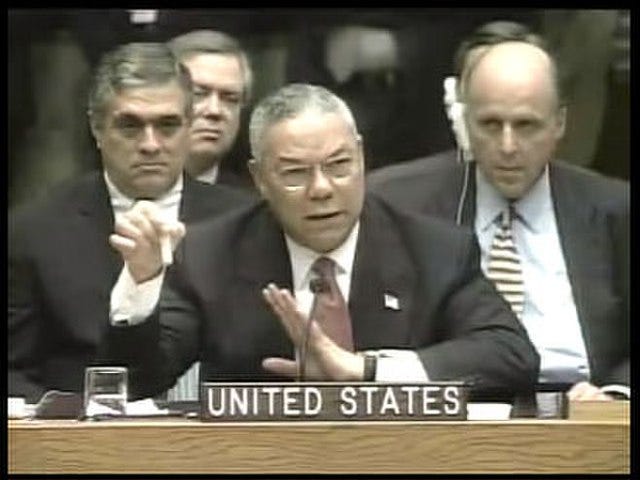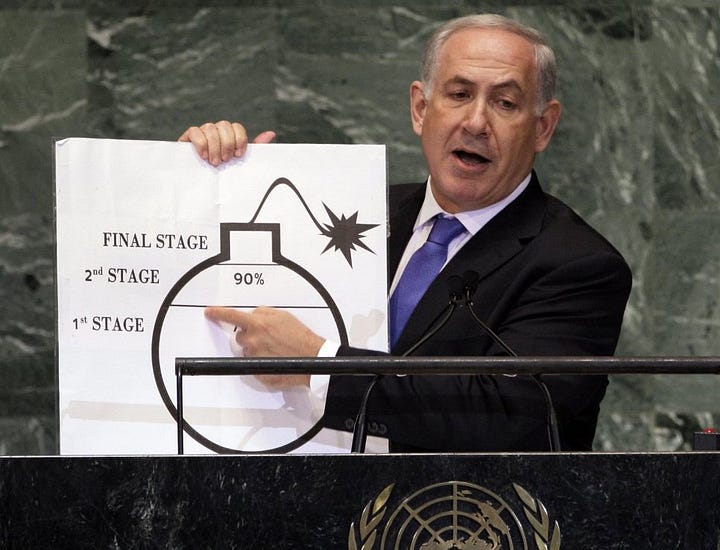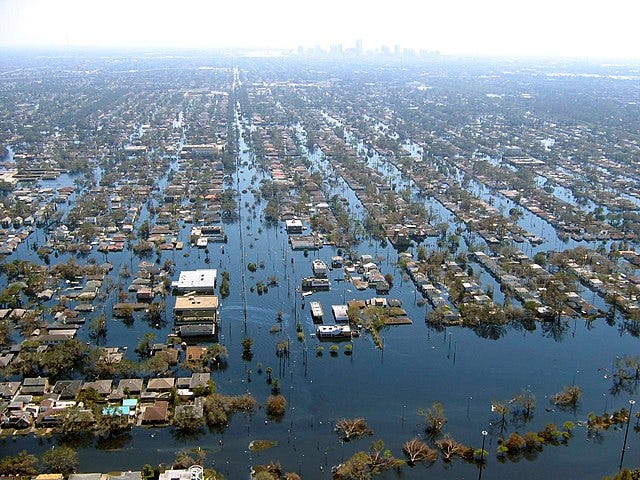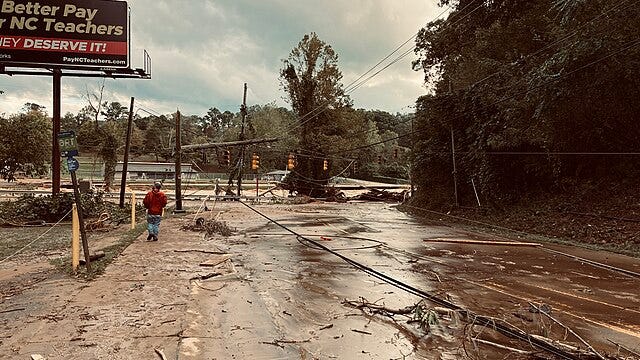That Time When I Was Right
What troubled me most about the run up to the Iraq War in 2003 was the phrase “Weapons of Mass Destruction.” I pay attention to spoken language, it interests me a lot, and I’d never heard that phrase. Out of nowhere “weapons of mass destruction” was suddenly coming from the mouths of politicians, pundits, journalists, and soon enough my own friends. I’m a playwright (I’d become a playwright partly because of that interest in spoken language) and as a playwright I like to give my characters different styles of speech.1 Writing plays always seemed the most useless skill in the world, but because of it now I knew in my bones what it meant to give a character a phrase to speak like weapons of mass destruction, even if I couldn’t prove it to all the non-playwrights around me.
Naturally most people around me were more concerned with the actual war itself than with the verbiage. Plenty opposed the war. Some because they opposed all wars. Others because they were actually knowledgeable about U.S. foreign policy. (I was not in either camp at the time.) Others were against attacking Iraq since Iraq hadn’t attacked us—and I agreed with that wholeheartedly—but no one holding that belief thought it would get traction in the media or the general public of 2003 America. In 2003 it felt like most Americans would have gladly carpet-bombed the moon if someone shouted “9-11” and pointed out the moon lacked a flag pin.
As a kid I was pretty smart, but no genius. I’d sometimes fantasized about being smarter. Wouldn’t it be fun to have some hidden insight that others didn’t have, like a magic spell or a psychic gift? To just know things that others didn’t? But when my weird skill as a playwright gave me an insider appreciation of how brilliant and evil “weapons of mass destruction” was it only made me feel sick and alone. I knew there was no counter argument. It was like Karate Kid except the Cobra Kai kids were the ones with the unstoppable verbal crane kick.
It bothered me that so many of my friends supported the war—it still does; I’m waiting for those apologies and admissions—but I’m enough of a history buff to understand that people love war—revenge is a powerful instinct. But to hear my own friends spout the manufactured language of propaganda, earnestly discussing weapons of mass destruction, that was ghastly.
A Brief Recap
For those born too late or who have mercifully forgotten the war that historians will see as the beginning of the end of American hegemony: George “Dubya” Bush had been sworn in to the presidency in January, 2001. He had not won the popular vote and arguably hadn’t won the electoral vote, but the Supreme Court in a 5-4 partisan decision blocked a Florida recount that would have elected Al Gore.2 At first Bush was fairly unpopular including a foreign policy dominated by some very hawkish crazies. Then the Afghanistan-based jihadi group Al Qaeda flew planes into the World Trade Center on September 11th, 2001 (“9-11”), and everything changed. Bush & Co. launched military operations in Afghanistan in collaboration with rebel factions there, introduced government-sanctioned torture, created draconian spying programs on U.S. citizens, and finally announced they needed also to invade Iraq.3


At first they said this was because Iraq had been working with Al Qaeda, but more honest and/or competent intelligence agencies quickly leaked information to discredit this.4 So Bush & Co switched to Iraq and started babbling about “weapons of mass destruction.” The U.S. would have to invade to find and destroy those “weapons of mass destruction.”
Bush & Co figured Iraq had chemical weapons because America had given Iraq chemical weapons in the 1980s during a brutal war with Iran. Bush & Co figured some of those chemical weapons must still be around.
So obviously Weapons of Mass Destruction was coined in a meeting room by malignant-but-creative people looking for a way to conflate those chemical weapons with imaginary biological and nuclear weapons to scare the American media and public into supporting the endeavor.5
It worked beautifully. The mainstream media loved the Iraq War. They patriotically froze out coverage of the enormous anti-war protests. The general public loved the Iraq War too. At first. But gradually support ebbed as the weapons of mass destruction turned out not to exist, as Iraq fell into a brutal civil war, and as the civil war trapped American soldiers in a prolonged and dangerous occupation.
The pullout of troops from Afghanistan to use for the Iraq invasion eventually allowed the Taliban to retake that tortured country; the brutal civil war in Iraq led to eventual control by Iranian-friendly Shia factions. The Iranian-friendly Shia control allowed Iran to transport better military technology overland through Iraq and Syria (thanks to another U.S.-encouraged civil war) to Hezbollah in Lebanon, allowing Hezbollah to hold its own against Israel today. So in every way for the U.S. the war proved a strategic disaster. Most of the public didn’t follow all this closely, but they sensed it. The media, increasingly distrusted since the mid-1970s, was distrusted even more.
Two Hurricanes
Of course, the legacy media no more admitted culpability in Bush & Co.’s War then they had in the slandering of Al Gore that brought Bush & Co. to power. But I think guilt or shame must have been bubbling below the surface because in 2005 when Hurricane Katrina hit New Orleans, the media waded in and, for the first time perhaps since Vietnam and the Civil Rights era they tried to tell the truth.
I was visiting the house of my friends John and Beth in New England when it happened. For days we listened to NPR as reporters in shock and outrage described the horrors of the flooded city, the flailing response of the Bush administration, and the wider political implications. Other television networks and newspapers, even cable news, worked hard as well. Reporters came face to face with poverty and race in America, the corruption of law enforcement, the limits of the social safety net, and the essential need for government. Following on the heels of sheepish exposes on the Iraq War and the flimflam around it, media coverage of Katrina marked the public unraveling of the Reagan-Clinton consensus.6 As a nerdish reading sort of person who dreams of vibrant journalistic culture bravely challenging those in power, it was possible to hope that Katrina would change everything.
But it didn’t.
Flash forward to Hurricane Helene. Whole towns in Appalachia are destroyed, some never to be rebuilt. There are hundreds of dead and missing. Possibly upwards of $50 billion in damages. Yet my entire experience of this horrifying catastrophe has been on social media. Maybe the news media did a great job that I don’t know about, but certainly no one is replaying clips of TV segments; the clips are from smart phone cameras; the messages are personal; the stories are in closed internet loops.


Whether I left the big bubble or the big bubble left me—or the big bubble popped altogether—I can’t say. Many of us seem to experience events now only through our self-developed individual media pockets, our mini-bubbles, self-curated mixes of legacy media sites, bloggers, substackers, podcasters, and youtubers. We each choose now how to connect perhaps without even realizing that it’s a choice.
Two Elections
The last time I remember experiencing the world thought a big national media bubble was the 2016 election between Hillary Clinton and Donald Trump. By then like many people—especially middle-aged and younger—I was already supplementing and interpreting legacy media reports through my own internet loops, but I still was experiencing legacy media as what “everyone” experienced. It still felt like when I was watching TV, other people were watching. It felt like we were seeing the same world albeit intepreted differently.
But 2016 there were Trump supporters, usually young males, who seemed to live entirely in internet pockets. That’s what led to accusations of Russian election interference. In 2017 the Alt-Right tried to turn internet pockets into a real world public movement using Charlottesville as the backdrop. I’ve written about that movement a lot. Trump tried to use internet pockets to prevent the counting of electoral votes on January 6th, 2021. Both attempts failed but the pockets are still proliferating as the legacy media declines.7
Today it seems most Americans, especially younger Americans, experience the world through pockets. Rarely do the legacy media tendrils reach around us and meet and inflate a bubble large enough to hold our shared attention: The debate between Biden and Trump did that and ended Biden’s career. The debate between Trump and Kamala Harris did that and made her a contender. But there’s not much else. Even Trump’s indictments and the assassination attempt against him seemed more noise than spectacle we all watched together.
Again, I have no way of being sure how widespread that experience is. I would guess that older Americans still experience television news as they always have, while younger age cohorts don’t. But that makes it a very different world.
In recent weeks Trump has looked as mentally unfit as Biden did in the summer, and if this were 2016 or even 2020 clips of Trump appearing senile would play nonstop for days and his poll numbers would drop several points. Yet the national media no longer has the power to do that. Various of Trump’s former cabinet members saying he’s dangerous is far too little and too late. Scandals used to sink candidates because the media would repeat them over and over while the public watched and eventually assumed that where there was smoke there was fire. Real scandals and fake scandals worked the same. Whatever the legacy media is repeating over and over today, if anything, most of the public is looking elsewhere.


By the way neither Trump nor Harris seem to be using the new internet pockets effectively. I’ve gotten innumerable, almost daily, requests for money from both on YouTube videos and on Facebook ads, but I’ve not come across any information about why they’re running, what they intend to do, or why I should vote for them. Absolutely nothing. They both claim to be good people “fighting for” me in some vague way without demonstrating that they know or care what I’d actually want them to “fight for.” This is especially surprising since internet pockets should be better at sharing information than legacy media. Bernie Sanders used the internet very well in 2016 so it’s something politicians can do.
Two Times When I Hope I’m Wrong
Since Kamala is the newcomer and relatively unknown beyond her name, this failure hurts her far more than Trump. I like Kamala Harris well enough, and I know she got thrown into this without much of a chance to prepare, but she hasn’t managed either to claim Biden’s accomplishments or distance herself from his mistakes. Her absolute support for the Israel will probably cost her Michigan, and there’s not a likely path to electoral victory without Michigan. Both Harris and Trump claims to be a vastly better people than the other. In Harris’ case that’s probably true, but so what? Trump’s supporters aren’t voting for him because they think he’s a good person. They’re voting for Trump because he’ll stick it to a system that they think doesn’t benefit them. I wish they wouldn’t vote on that logic. It’s historically naive and foolish. But it doesn’t seem like the Democrats understand this at all and that is scary too. That’s part of the job of a competent leader.
In this election for the first time in my life not one candidate, federal, state, or local, has actually asked me for my vote. Not in person. Not online. Not in an ad. No campaign that I’ve seen—federal, state, or local—tells a real story about the world, our place in it, the candidate’s place in it, and how the candidate will improve things for me. This gives the playwright part of me a sinking feeling that they have no idea what campaigning even is. I get the sick fear that they think they’re pop stars trying to be cool. They don’t know what dialog to put in the mouths of themselves. Of course, Trump doesn’t care, and to his supporters that’s part of the appeal.
I hope if Kamala Harris loses, her most ardent supporters won’t blame it on sexism or racism. That got us nowhere after Hillary Clinton’s defeat. And I hope her critics and supporters realize she wasn’t too far to the right or left. If she loses it will be because her campaign hasn’t told a coherent story as I said above. Hopefully, she wins anyway, but I don’t feel good about it. Vibes over policy will seldom work for the left. Voters usually prefer right-wing style and left-wing policy. They like cis-gendered social security and WASP free health care. That’s why the Reagan-Clinton consensus has always been a losing brand for the Democrat party despite its popular-vote majority.
I started this post with the sick and alone feeling I had about the Iraq War, seeing so many around me mouthing propaganda and sensing where that would go. I get an even worse premonitions about Israel’s war on everything that moves. We are witnessing the early stages of a terrible event. Like Bleeding Kansas before the Civil War, the rise of fascism in Europe before WWII, the French Revolution before the Napoleonic Wars, Israel is doing horrible things that will impact the world for decades to come, and the U.S. is knowingly, willingly, foolishly supplying the weapons. Maybe the relative silence around this catastrophe is a symptom of the vanished media bubble. Maybe the legacy media just aren’t big enough to reach the public.
Regardless, when I do find the war mentioned by politicians, pundits, journalists, and even my own friends and family, the excuses are heartbreaking. So much propaganda.8 I remember the first time Israel blew up a hospital. We heard that the hospital supposedly had a Hamas command center underneath. When that turned out not to exist, Biden’s people said, no, it was a stray rocket from Hamas itself that blew up the hospital. But then another hospital blew up and another, and now Israel has conducted 94 attacks on Palestinian medical facilities. No one even makes excuses anymore. American supporters of these actions just close their eyes, stick their fingers in their ears, and say la la la la la. Nor do they even try to excuse the sexual assault of prisoners, constant sniper attacks on children, and murder of journalists, poets, university professors, and others whom Israel knows were never part of Hamas.
Israel has simply gone insane, and the U.S. is foolish for continuing to support that insanity. The U.S. didn’t give unconditional support to Israel during its wars of independence when the country’s existence really was threatened. We should not be giving unconditional support now when the biggest threat to Israel is Israel. By far. (Seconded only by U.S. support.) I saw this same arrogance in Iraq War but now the consequences are potentially far worse.
Israel is now imminently planning to attack Iran. With yet more U.S. support. Yesterday honest and/or competent intelligence agencies leaked information about the attack, trying to stop it presumably, but that is no more likely to stop this onslaught then similar leaks stopped the Iraq War. The historical cycle that began with World War II is coming to an end, and terrible new cycle is about to begin.
I hope I’m not smart. I hope my foreboding about the election and the war prove utterly wrong. I hope my playwright’s sense is as useless as I once assumed it would be.
Thanks so much for reading Blame Cannon!
Last week I finished a series of posts called Welcome to Charlottesville. Check out an index here. I’ll be writing a few more posts of odds and ends over the next couple of weeks, and then start a new series with history and cities and anthropology in November, including a piece on the Yamasee War and an update on the Monacan diorama.
Please subscribe and share!
Comments are welcome but please no personal insults or profanity!
A lot of writers like David Mamet, Harold Pinter, and Quentin Tarentino prefer to have all their characters speak in a similar style to create the sense of dramatic unity.
The state government of Florida was run by George Bush’s older brother Jeb Bush who firmly kept his thumb on the scale in various ways throughout the process. Also note that the media had piled on Al Gore in incredible ways, the execrable Kit Steelye of the New York Times and loathsome Cici Connolly of the Washington Post seemingly competing (along with Frank Rich and Maureen Dowd) to spread nonsense about him, that he claimed to have discovered Love Canal, that he claimed the novel Love Story was based on him, and that he invented the internet. Then having invented these and other lies, they presented Gore as the liar. It was an incredible performance that, along with the third party candidacy of Ralph Nader, still didn’t manage to rob Gore of the popular vote. Gore was very ineffectual in combating all of this.
One of the reasons Bush & Co. didn’t heed warnings about plane attacks was that they were obsessed with nonsense like the idea of Saddam Hussein shooting missiles with anthrax instead.
Saddam Hussein, the secular Ba’ath Party-backed dictator of Iraq, and Al Qaeda, the fundamentalist fanatics, were sworn enemies. While Iraq had nothing to do with 9-11, certain members of the Bush administration thought it did because some of their tortured prisoners said it did to stop the torture.
“Support” meant emotional support only. The Reagan-Clinton consensus does not consider war bonds, public enlistment campaigns, or public-private manufacturing and supply as the New Deal had. Private contractors, professional armies, and spy agencies handle everything.
The collapse wouldn’t come until the 2008 Great Recession. The Obama administration’s failure to response adequately or appropriately to that crisis brought us Trump. What would have happened if FDR hadn’t responded to the Great Depression with the New Deal? Obama’s response to the Great Recession tells us.
I’ve written about this before but I think the most underappreciated aspect of the decline in the media is the sense that media work for their sources, advertisers, and fellow journalists, and feel no loyalty to readers. The New York Times and NBC News want me to believe they are important but they have no sense of what news I might actually want or need.
And propaganda about the propaganda. This is a story about this horrible person.


